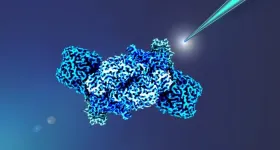(Press-News.org)
“Given that the MET inhibitor capmatinib caused a remarkable response in Dr. Blagosklonny, a pertinent question remains as to why he was not treated with ‘preemptive drug combinations’ [...]”
BUFFALO, NY- February 23, 2024 – A new editorial paper was published in Oncoscience (Volume 11) on February 9, 2024, entitled, “A very long and winding road: developing novel therapeutics for metastatic tumors.”
In this editorial, researcher Paul Dent from the Department of Biochemistry and Molecular Biology at Virginia Commonwealth University writes that tumors that have metastasized to distant locations, such as the brain, are most often impossible to treat and cure, although immunotherapeutic approaches have had recent successes in some tumor types such as NSCLC and cutaneous melanoma. There is, however, also considerable evidence that immune therapy may cause hyper-progression in some NSCLC patients, potentially including Dr. Blagosklonny, whose tumor comprises METex14 and amplification of MDM2, as well as in melanoma and NHSCC patients.
“There are several issues that presently preclude more effective control of solid tumors both in situ and as metastatic disease.”
The first is that the mutations which drive a cancer phenotype are generally the combination of subtle alterations in cell biology, any one of which, if targeted, if it can be targeted, will only have modest effects on tumor growth and survival. Conceptually, this calls for an immediate use of two- and three-drug combinations blocking key signaling pathways to achieve effective tumor control regardless of whether resistance mechanisms evolve. Second, a corollary of altered cell biology, and highlighted in the article, is that fewer tumors have a single recognizable driving oncogene to which the tumor cell is specifically addicted for growth and survival, e.g., mutant RAS proteins, mutant EGF receptors and other mutant receptors of MET, RET, and HER2.
“And even under these circumstances based on a large body of evidence from the past 20 years is that such tumors also require treatment with two- and three-drug combinations that simultaneously interdict the primary driving oncogene, block signaling from the primary evolving resistance mechanism and even block signaling from a secondary survival pathway.”
Continue reading: DOI: https://doi.org/10.18632/oncoscience.595
Correspondence to: Paul Dent
Email: paul.dent@vcuhealth.org
Keywords: chemotherapy, MET, immunotherapy, evolutionary resistance mechanisms, lung cancer
About Oncoscience:
Oncoscience is a peer-reviewed, open-access, traditional journal covering the rapidly growing field of cancer research, especially emergent topics not currently covered by other journals. This journal has a special mission: Freeing oncology from publication cost. It is free for the readers and the authors.
To learn more about Oncoscience, visit Oncoscience.us and connect with us on social media:
X, formerly Twitter
Instagram
Facebook
YouTube
LinkedIn
For media inquiries, please contact media@impactjournals.com.
Oncoscience Journal Office
6666 East Quaker Str., Suite 1D
Orchard Park, NY 14127
Phone: 1-800-922-0957, option 4
###
END
Physicians and scientists have known for many years that our genetics not only shape our physical features like our smiles but also our risk for developing certain diseases.
The problem? Most people don’t know if they have inherited these genetic risk factors for disease.
In Our DNA SC, a statewide genomic screening program launched by the Medical University of South Carolina (MUSC), aims to change that.
The program, the first and only program of its kind in the Southeast, is led by Caitlin G. Allen, Ph.D., a ...
ARLINGTON, Va.—The Office of Naval Research (ONR) — and its international arm, ONR Global — participated in the recent Autonomous Warrior 2023 (AW23) exercise, located at HMAS Creswell in Jervis Bay, Australia.
AW23 brought together Australian military allies, as well as industry and international partners, to demonstrate various technologies designed to help the Royal Australian Navy strengthen its capabilities in the area of undersea warfare — including uncrewed (also called unmanned) and autonomous systems, artificial intelligence and machine learning, and logistics, ...
Researchers have shown that the drug benralizumab is as effective and safe as mepolizumab for inducing remission in patients with eosinophilic granulomatosis with polyangiitis (EGPA) according to a study published today in The New England Journal of Medicine. The results of the non-inferiority study were presented at the American Academy of Allergy, Asthma & Immunology annual meeting in Washington, D.C., by Michael Wechsler, M.D., pulmonologist, director of The Cohen Family Asthma Institute at National Jewish Health and lead author of the paper.
EGPA is a rare form of vasculitis, characterized by inflammation in the small blood vessels. This inflammation ...
An international team, including researchers from McMaster University and St. Joseph’s Healthcare Hamilton, has identified a new therapeutic for patients with a rare autoimmune disease called eosinophilic granulomatosis with polyangiitis (EGPA). A biologic drug called benralizumab has been shown to be non-inferior to mepolizumab in the treatment of EGPA.
In a clinical trial involving 140 patients with the rare disease, researchers directly compared two biologic drugs, mepolizumab and benralizumab. Patients received monthly subcutaneous injections of either 300 mg of mepolizumab or 30 mg of benralizumab for one year. The findings of the trial were published on Feb. 23, 2024, in the New ...
Nitrogenases are considered promising candidates for the sustainable enzymatic production of ammonia and carbon compounds. Unfortunately, one bottleneck in this complex process, the supply of electrons to the enzymes, has remained a mystery until now. Now a team at the Max Planck Institute for Terrestrial Microbiology in Marburg has discovered two essential electron carriers which play a key role in determining the performance of iron (Fe) nitrogenase, thus opening up new possibilities for elucidating and maximizing nitrogenase's potential.
Nitrogenases are catalysts for several industrially relevant ...
Machines still can’t think, but now they can validate your feelings, based on new research from New Jersey Institute of Technology Assistant Professor Jorge Fresneda.
Fresneda started his career as a chemist and then became an expert in neuroanalytics. He studies how measurements of brain activity and skin conductance can predict a person’s emotions with high accuracy, and how such information can be used in fields such as entertainment, management, marketing and well-being.
“Neuromarketing is a subfield within marketing ...
ITHACA, N.Y. – Scientists have long believed that a newborn’s immune system was an immature version of an adult’s, but new research from Cornell University shows that newborns’ T cells – white blood cells that protect from disease – outperform those of adults at fighting off numerous infections.
These results help clarify why adults and infants respond differently to infections and pave the way for controlling T cells’ behavior for therapeutic applications.
This discovery was described in a paper published in Science Immunology on Feb. 23, co-led by Brian Rudd, associate professor of microbiology ...
Understanding cloud patterns in our changing climate is essential to making accurate predictions about their impact on society and nature. Scientists at the Institute of Science and Technology Austria (ISTA) and the Max-Planck-Institute for Meteorology published a new study in the journal Science Advances that uses a high-resolution global climate model to understand how the clustering of clouds and storms impacts rainfall extremes in the tropics. They show that with rising temperatures, the severity of extreme precipitation events increases.
Extreme ...
A new study has revealed that employees who are more mindful in the digital workplace are better protected against stress, anxiety and overload.
Researchers from the University of Nottingham’s Schools of Psychology and Medicine analysed survey data from 142 employees. The results have been published today in PLOS ONE.
PhD student Elizabeth Marsh from the School of Psychology led the mixed methods study and said: “As work is increasingly mediated by digital technology we wanted to find out the impact this is having on people’s health and whether there are ways to mitigate this. We found that being mindfully and confidently digital should be considered important elements ...
Scientists are a step closer to unravelling the mysterious forces of the universe after working out how to measure gravity on a microscopic level.
Experts have never fully understood how the force which was discovered by Isaac Newton works in the tiny quantum world.
Even Einstein was baffled by quantum gravity and, in his theory of general relativity, said there is no realistic experiment which could show a quantum version of gravity.
But now physicists at the University of Southampton, working with scientists in Europe, have ...






